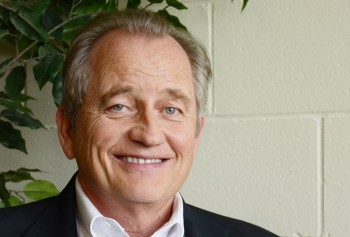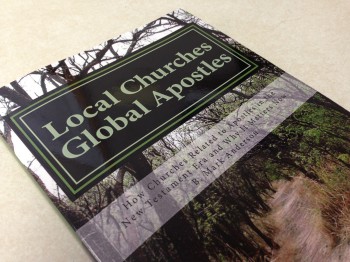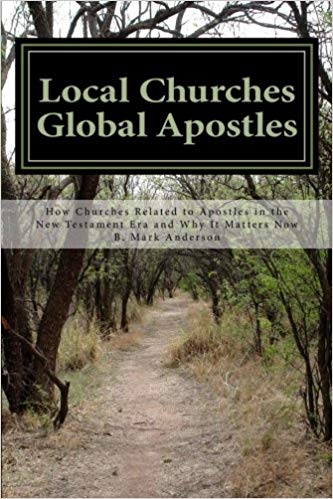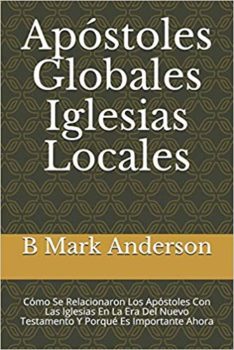
Do modern day apostles exist?
Modern Day Apostles? Do They Exist Today?
Or are all who currently claim to be an apostle imposters?
To get started, let’s expand our thinking on the subject. How many people are specifically designated as apostles in the New Testament? To many it comes as a surprise that 25 individuals are mentioned as apostles in the pages of the New Testament! Imagine—twenty five apostles! This eye-opener paves the way for the acceptance and recognition of modern day apostles. It shows there were more apostles after the original twelve that Jesus designated.
Yes, modern day apostles and prophets exist and function in churches today. We will see extensive Biblical evidence for this in a moment. But first, it might be good to dispel the most common reasons used to deny the fact that modern day apostles and prophets do exist. Click here for a definition and understanding of “What is an apostle?”
Reasons Why Some Deny the Existence of Modern Day Apostles
One fellow wrote that there are no modern day apostles. He repeated the tired, worn-out arguments of the traditional deniers who say modern day apostles cannot exist. He claimed since Christ had died no one could any longer “see the Lord.” He also stated that we don’t need modern day apostles any more because the Scriptures have been written and the canon is closed. He believed that all modern day apostles are imposters, false leaders of the blind.
Let’s examine one of these arguments–the thought that no modern day apostles exist because of the “requirement” that every apostle must see the Lord.
This false concept is based on 1 Cor 9:1 where Paul asks, “Am I not an apostle?” and “Have I not seen Jesus our Lord?” While Paul is clearly attempting to furbish his credentials, he is not laying out a qualification that every apostle must see the Lord. If that were the case, Timothy could not be an apostle. Paul hooked up with Timothy in Galatia in about 49 or 50 AD. Christ was crucified in Jerusalem sometime around 30 AD. Young Timothy may not have even been born by the time Christ was crucified! Yet he is named as an apostle in First Thessalonians 1:1 when coupled with 2:6. Obviously, when Paul spoke of “seeing the Lord,” he was not laying out a requirement or saying that every apostle must have seen Jesus in the flesh.
Further, what does it mean to “see the Lord?” There is no time in the Bible where Paul physically saw Jesus in the flesh. Yet Christ did appear to Paul in visions or a trance on four occasions. Does “see the Lord” include visions and revelatory experiences? Apparently so, and if this is the case, the bar is rather low. I have seen the Lord in a vision, yet I am certainly not an apostle.
Here’s another reason some leaders deny the existence of modern day apostles. This reason is at least partially legitimate. God began restoring modern day apostles to the church about the time World War Two ended. A few of these early pioneers got into excesses and errors so badly that stable church leaders thought, “This can’t be of God!” And so they denied even the legitimate existence of apostles that the ascended Christ appointed (Eph 4:11-13).
Biblical Evidence for the Existence of Modern Day Apostles
Now let’s look at a number of Biblical references that show God’s plan is for modern day apostles and prophets to continue to function in the church.
Christ gave gifts (apostles, prophets, evangelists, pastors, and teachers) after he ascended into heaven (Eph 4:11-13). These gifted people could not have been among the original twelve of Peter, James, and John! Rather, they are ascension-gift ministers given to the Church Age. They are members of the five fold ministry and include modern day apostles.
Apostles are given by Christ for the equipping of the saints for the work of service. Are the saints (Christians) fully equipped? No way. Have we all attained to the unity of the faith? Not yet! We still need modern day apostles to equip and unify church members. See a one minute video on the subject by one of the modern day apostles that I have interviewed.
In Ephesians 2:20-22 the Scripture declares the church is built upon “the foundation of the apostles and prophets, Christ Jesus Himself being the corner stone.” Christ was the cornerstone then just as He is today. Apostles and prophets were the foundation then, just as modern day apostles and prophets are today.
This truth is underscored by the fact that God has given a primary (foundational) place in the church to apostles and prophets. Paul states that God has appointed in the church “first apostles, second prophets, third teachers, then miracles, then gifts of healings, helps, administrations, various kinds of tongues.” (I Cor 12:28). While some want apostles to disappear, there is never a call for teachers or administrators to cease to exist. Apostles remain in God’s plan until He comes again.
Paul wrote I Corinthians about 55 or 56 AD, at least 20 years after the crucifixion and resurrection. This could in no way refer to the original twelve apostles. There needs to be no doubt for anyone with an open mind that the gift of modern day apostles is given to the Church Age.
Paul offers further insight. “By referring to this, when you read, you can understand my insight into the mystery of Christ, which in other generations was not made known to the sons of men as it has now been revealed to his holy apostles and prophets (Eph 3:4-5).” Paul is saying there is a revelation that has been given now to his generation that was not given to earlier generations. It was not given to men of the Old Testament Era. Rather, it was a fresh revelation and was received by men in the current New Testament Church Age.
(What was the insight to which Paul referred? It was the startling, even unthinkable idea to Jews that Gentiles would become part and parcel of the Body of Christ and become equal heirs of the kingdom.)
I’m thankful to Dr. Jim Feeney, the gifted Pentecostal Bible teacher, who showed me insight in Ephesians 3:4-5. Dr. Feeney offers more evidence for the ministry of modern day apostles and prophets at http://www.jimfeeney.org/apostlesandprophets.html
My book Local Churches Global Apostles: How Churches Related to Apostles in the New Testament Era and Why it Matters Now addresses a wide range of issues for both early and modern day apostles.
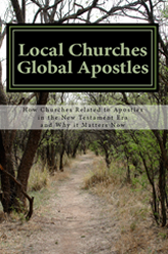
Local Churches Global Apostles
Here’s what ministers are saying about the book.
In an age where true apostolic fathers are being restored to the church, Mark Anderson hits the nail on the head. Mark’s work is historical, theological and very pastoral. A must read in this hour. –Mike Giordano (Mike Giordano is recognized by many as a modern day apostle).
“Get ready for a paradigm shift in how you view New Testament church life! Mark’s work may delightfully shatter your presuppositions as he brings fresh insight to how the first century apostles related to local churches. Thoughtfully researched and humbly written, Mark blends both Biblical insight and many years of pastoral experience to bring us this valuable book!”
R. Sonny Misar
Journey Ministries, LLC
Author of Journey to Authenticity
Grab a copy at www. ChurchesandApostles.com.

